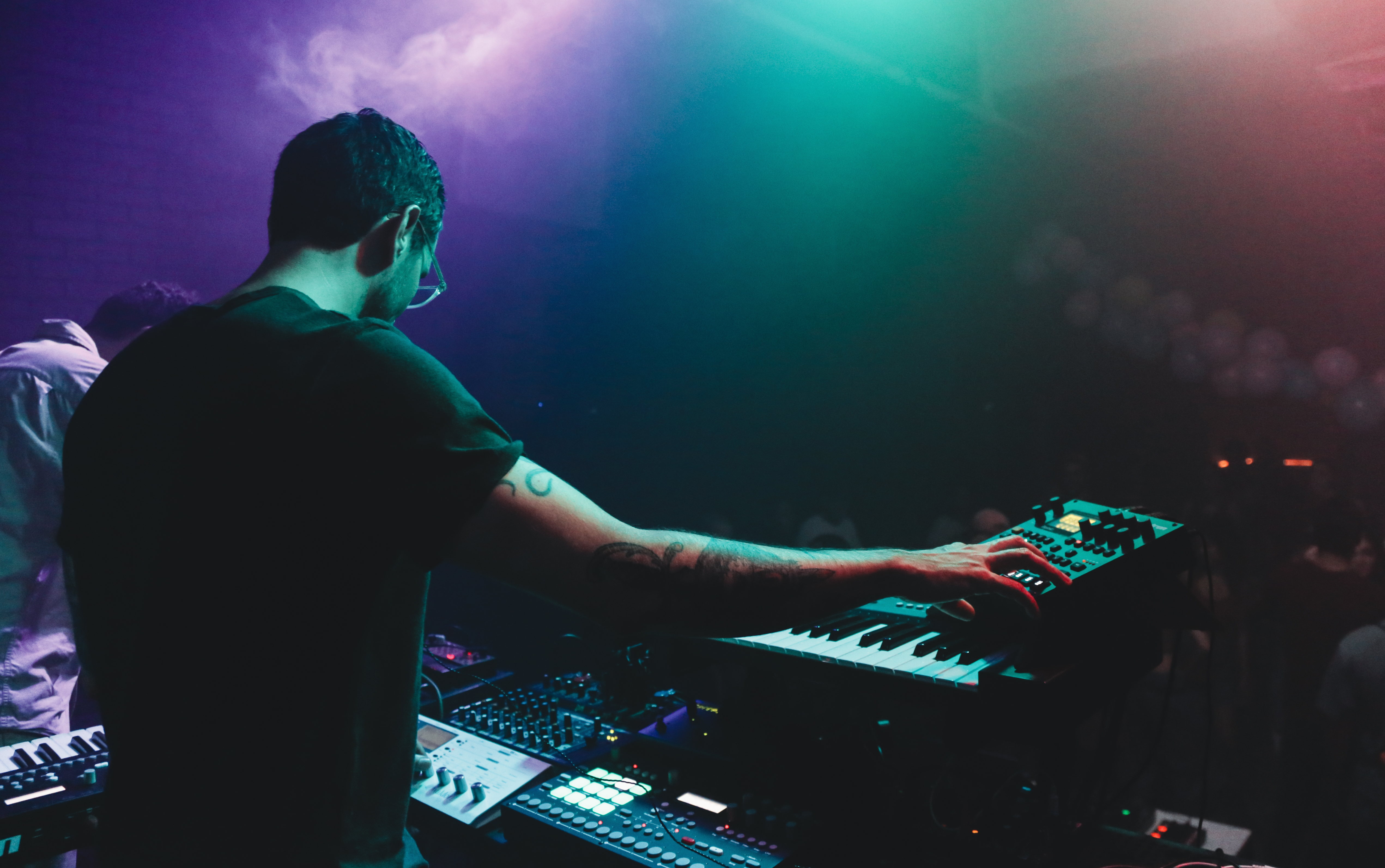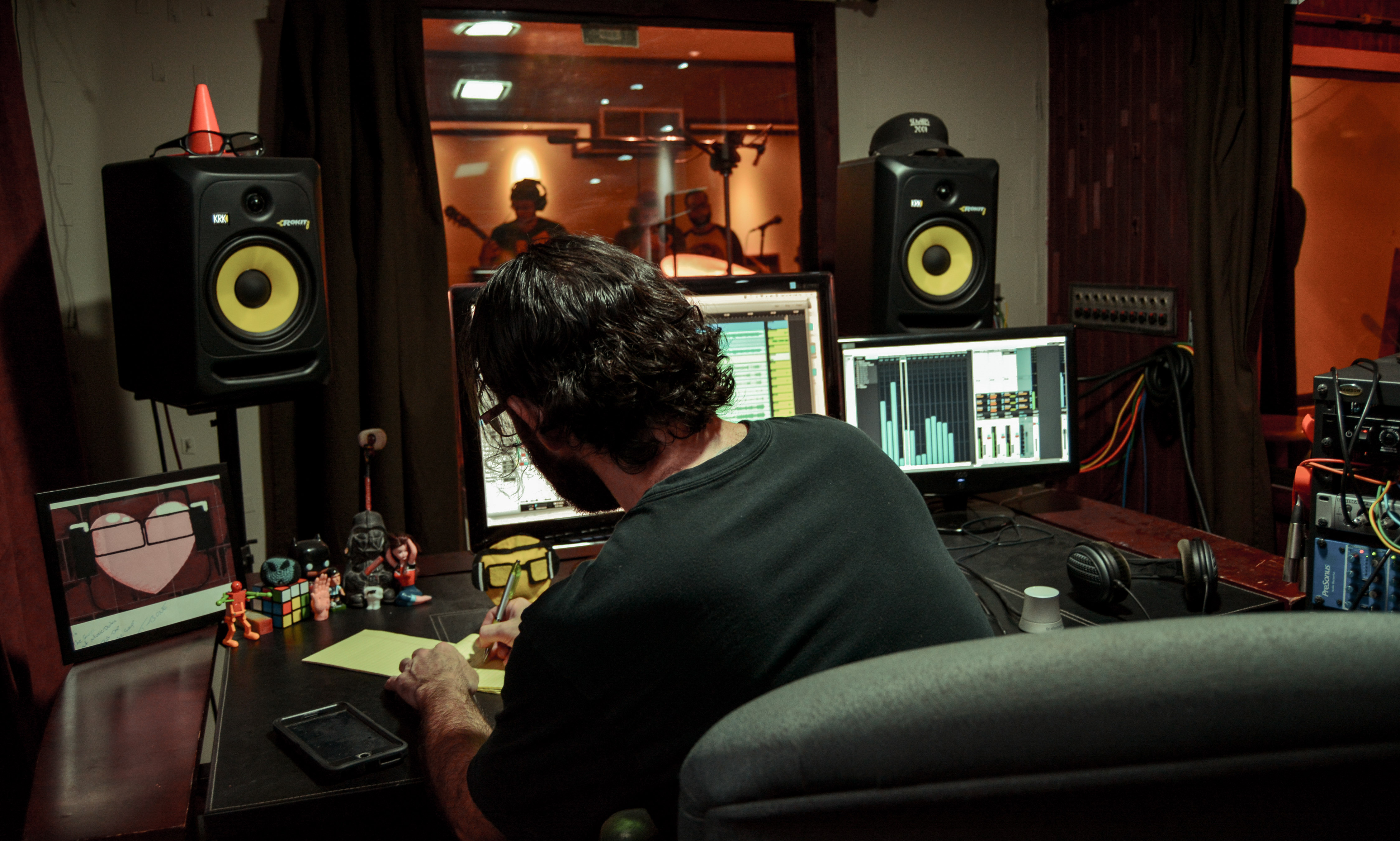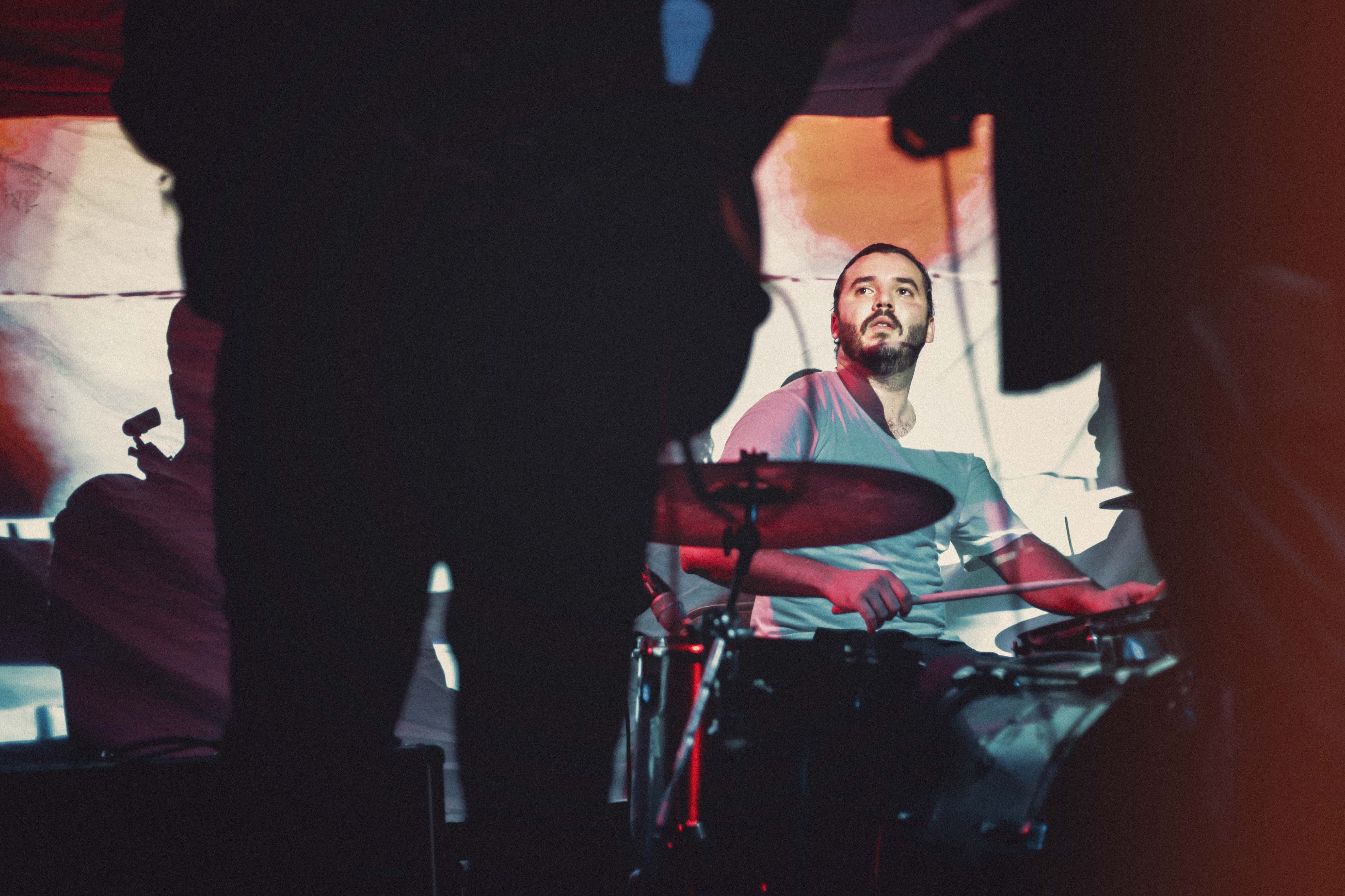Power is generally consistent today at three mainstay venues in San Juan’s independent music scene: El Local, a Santurce DIY dive; La Respuesta, a larger venue nearby; and Club 77, a mid-capacity spot in Río Piedras. But functional venues don’t mean the community has fully regained agency, as survivors are still reeling from Hurricane María’s residual effects, from unemployment and depleted financial resources, to costly home repairs and forced relocations. And coping with loss — loved ones perished or those gone with the exodus — and a general lack of stability can be devastating to a person’s mental health.
For DIY musicians and artists, there is sometimes catharsis in creativity. But that hardly pays the bills, even in the best of circumstances. Before the storm, Puerto Rico’s economy was already decimated; unemployment began crawling back into the double digits in July, and in February was clocked in at 12 percent.
Today, more than six months later, life on the island is shaky, and constantly threatened by uncertainty. About 10 percent of the island is still in the dark, with intermittent outages even in areas where electricity was previously restored. And crime has risen significantly: Exceeding last year’s stats for the same month by 20 incidents, a total of 78 homicides occurred in January island-wide.
Politically, things aren’t much better, with widespread disapproval of Governor Ricardo Rosselló’s plans for reform, which rely heavily on privatization (schools, including the implementation of charters, and the selling off of the electrical authority, a fresh wave of cuts to labor protections — all while government agency chiefs and lawmakers are among the highest paid in comparison to the U.S.
For DIY musicians and artists, there is sometimes catharsis in creativity.
We spoke with a handful of musicians upholding Puerto Rico’s indie scene about their experiences during and after the storm — their struggles, how their creative work was affected, and learned a bit about their plans for moving forward.
Surviving the post-storm financial strife
Recluso is a beatmaker whose production work dates back more than a decade. Part-time work supplements his gigs, but both revenues became obsolete post-storm. One event, a series dubbed the Beat Scene, finally picked back up late January.
“We’re doing better now. I wouldn’t say we’re OK,” Recluso notes.
Some of his equipment was damaged when water unexpectedly seeped through the ceiling in various rooms of his 12th-floor apartment in Río Piedras, which he shares with his wife and 2-year-old daughter. He made sure to keep one item, a battery-powered sampler, with him in a backpack, while they took shelter in a hallway as the building swayed like a slow-motion pendulum in the fierce storm winds. He’s grateful his daughter slept through it all.
But before he can repair any gear, he and his family need to buy a new refrigerator. When the power was finally restored three months post-storm, they realized theirs had stopped working.
First, though, the family has to finance a move. Their property is owned by his wife’s abuelo, who recently died. He was bedridden prior to the storm; without electricity and air conditioning, his condition worsened.

“I don’t know how it happened, but he got sick in the hospital. He was elderly; he was very old, and it seems he didn’t cope well with the change from home to hospital,” Recluso says. “It was too much for him.”
The property will pass on to his children, so Recluso, his wife, and child will have to find a new apartment. He’s concerned about rising rent costs, and whether or not he’ll be able to secure a full-time job.
Throughout the storm, they rationed food carefully; his wife wasn’t able to work, either. One day, they happened to pass by a retirement community while donations were actively being delivered; his wife asked, and the supplies were shared. Neighbors helped, too.
Some support from the music scene came his way, though — in Gisela Rosario of Macha Colón y los Okapi and Alfredo Richner, founder of local blog Puerto Rico Indie. “I don’t know how they got it, but Alfredo gave me food, then Gisela brought me some. She got in touch with me and brought me food. They helped me twice with food,” he says.
His wife received aid from FEMA, but Recluso was denied. He’s since applied for grants from Beta-Local, an arts-focused nonprofit, and the Puerto Rico Independent Musicians and Artists Fund (PRIMA), founded by Buscabulla and Ani Cordero.
Meanwhile, at El Local in Santurce, about a 15-minute drive away, where Recluso has performed countless times, there was help — within a couple weeks of the storm, El Local reopened with a volunteer-run community kitchen, serving three meals daily during a 12-hour period. But without a car, and with all public transportation defunct, he couldn’t get there.
Lu Li, an electronic artist who plays in a duo with Daniela Romero called La Emperatriz, was able to benefit from the camaraderie and support she found at El Local. “We could go there and use our equipment, and the boys [who run the space] were open to let us create there.”
“There was no money. We had to buy food outside. We were struggling every day.”
Damage to her own gear was incurred after the storm as a result of power surges.
“One of the speakers broke, and my mixer, and it’s because power is not regulated and sometimes it comes super strong and sometimes it goes low, and I didn’t have a battery for it,” she says.
A grant from PRIMA made repairs possible; La Emperatriz is now playing shows again. Li has also started working with Sonic Arts for All, a New York City nonprofit that brings electronic equipment and technology into music education at local schools, after-school programs, and community centers. Founder Max Alper is building strategy with Shanti LaLita, a stalwart of the San Juan scene who relocated to NYC post-María, to bring SOFA to Puerto Rico, and they’ve enlisted Li.
Metal scene stalwart Weslie Negrón, formerly of Zafakon and now heading up another project, MOTHS, is thankful his job as a private university admissions officer wasn’t lost. But like most, he felt his finances strangled by the lack of electricity. Service wasn’t restored to his area until January 6. Spending money on food daily, rather than cooking at home, rapidly added up, and days without Internet meant no work for him or his girlfriend, who is a graphic designer.
“There was no money,” he says. “We had to buy food outside. We were struggling every day. I was literally mad, angry all the time. I couldn’t deal with anything because I just didn’t have the basic stuff to be comfortable anywhere.”
Jorge Mundo’s band Los Vigilantes played an acoustic set at El Local early on, when there wasn’t power. He contributes to other bands too, but his primary income is generated in the basement of his home in Caimito, a municipality at the southern end of San Juan, where he operates El Dorado Studio.
“I moved all my equipment to a dry spot where I knew it wouldn’t flood, and I put things under the door so too much water wouldn’t come in. So my house was fine,” he says. “But my neighbor, my front neighbor, I can hear him hammering. He’s fixing his roof right now.”
Returning from the tumultuous experience at a friend’s home during the storm (a window blew out, for one), Mundo helped neighbors clean up debris around his street. Right away, a nearby pool, clogged with fallen tree limbs and abandoned by the owners of a storm-damaged home, became a mosquito breeding ground, despite Mundo’s best efforts. Seeking refuge from the swarm and tired of enduring it all alone — cell towers were still down, and gas was scarce — he went to stay with friends. He returned a few weeks later to find his house had been burglarized.
“They stole my laptops — it wasn’t anything too bad,” he stresses. “I didn’t get any of my instruments stolen or my recording equipment; my laptops, I guess that counts as recording equipment, but it was mostly my gaming console, my laptop. The buckets I use to flush the toilets, they stole that as well. They stole a machete and some gardening shears I had when I was clearing the backyard.”
María halted projects for many
Electricity was restored to the area around El Dorado studio soon after, but Mundo says he spent more than 100 solid days without water. (Lately, it comes and goes, he says.) He’d been collecting rainwater, which he’d make potable with Clorox, iodine, and filtering. But keeping toilets full is a major reason that, even when electricity returned, he couldn’t run his studio at full capacity.
“It’s kind of hard to have 20 people come to your house if you have no water for the bathroom,” he says. “It gets very nasty, very quick.”
He made it work, though. Bands started booking the studio again; ones he wasn’t familiar with, hailing from other parts of the island still without power.

Still, release dates for many were postponed, like Weslie Negrón, who’d planned to unveil the debut EP from MOTHS by the end of 2017.
Music Dorks, the studio where MOTHS is recording, has reopened; its owner, Daniel Figueroa, is their drummer. Two of the band’s key songwriters, at least, remain in Puerto Rico, and a PRIMA grant allowed them to usher the EP along. With a reworked lineup, MOTHS has resumed the process, and also played their first post-storm show on March 2 at Club 77.
Key musicians lost to the exodus
“I would say about 10 or 12 of the bands that usually come [to El Dorado studio] have at least lost one member,” says Mundo.
Mundo’s own band is no exception from the exodus of Puerto Ricans moving out of the island. Los Vigilantes isn’t breaking up, but drummer Rafa Díaz has moved to San Francisco — indefinitely — with his girlfriend.
“María completely took away all smoke and mirrors and left us exposed to our thoughts, fears, our poverty, inequality, and broken government.”
“And he bought a car, he bought a van so we can tour and stuff,” he says. “But he’s planning to stay there. He got a decent paying job.”
The music community lost another drummer in Miles Freeborn, a Seattle expat who’s returned to his native city with his partner, Emi Pop. Both were playing in the current incarnation of Los Pepiniyoz, a pop-punk act with a long and winding lineup history.
Zuania Colón, bassist and core Pepiniyoz member, says, “It feels like that show The Leftovers, where half the people vanished altogether. That’s how I feel with half my friends, including bandmates, whom are also my family.”
Los Pepiniyoz will reunite next month for a special event, when legendary Argentine punk act 2 Minutos plays Club 77. Meanwhile, Colón and founding frontperson René Cervoni are crafting a new project; she jokes that lyrics will likely reference “being in the dark a lot.”
There’s release in creating, she says, and relief in the community that welcomes that work, and was bolstered by the help at El Local, PRIMA’s ongoing grant deliveries, and a few generator-run house shows that were organized in the months after by members of Las Abejas, which featured associated bands like Reanimadores, Desahuciados, Moreira, and Dogos.

“María completely took away all smoke and mirrors and left us exposed to our thoughts, fears, our poverty, inequality, and broken government,” she says. “If you stayed home after the hurricanes you’ve been shook and changed even if you have power, water, and a roof over your head. Knowing most of your people don’t, and knowing that whatever you are doing to help is never gonna be enough, kills you; it kills me. And so all this chaos and frustration is gonna come through in anything we do in our music.”
The scene right now feels sturdy in its sense of community.
The departures continue mounting: The official count of Puerto Ricans who have relocated outside the island in the wake of the storm is more than 135,000.
“Everyone, all the scenes, it doesn’t matter which scene you go, the punk the metal, the indie, the whatever — everyone lost people,” Negrón notes.
The scene right now feels sturdy in its sense of community, and fortified by a palpable will to move forward and not only maintain, but expand, the foundation built by decades of creative work. Venues’ calendars are filling up like they used to before María, and the crowds are coming out in mass response.
Puerto Rico’s independent music scene has always been a dynamic and ever-changing one, every year better than the last, despite whatever setbacks. Surviving María was grueling, but that crux can become a springboard, albeit an unexpected and unwanted one, that’s made positive in launching yet another incredible incarnation of the scene.







